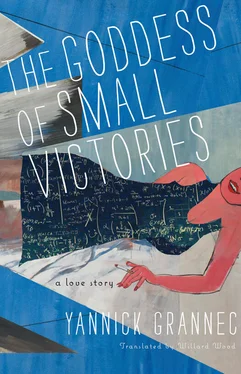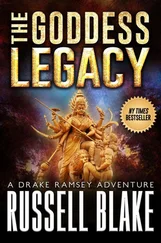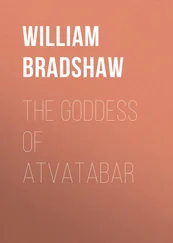When we arrived at the corner of Mercer Street, Morgenstern asked Einstein whether he should drop him off at home or at the Institute. Albert mumbled that he didn’t care. Unused to seeing him morose, I grew worried. His face was tightly drawn, and he had hardly teased Kurt at all during the trip.
“Do you feel all right, Professor?”
“A little too much politics, perhaps?”
“That must be it, dear Oskar. And not enough physics. Being a pacifist is an uphill battle. And a battle you take no part in. The bitter lessons of the past constantly need to be relearned.”
“I prefer to look to the future.”
“I have lived through two major wars. I am worn out with the prospect of another one. I don’t know what the third world war will resemble, but I am certain that there will not be many people around to see the fourth.”
He got out of the car and knocked on the rear window.
“Hearty congratulations on your next-to-last exam.”
“Is there another one?”
“The last one is when you jump into the grave, Gödel.”
He disappeared into the little white house without pausing to say goodbye.
“What did he mean by that?”
“It was just a joke, Kurt!”
“I have never seen him so depressed.”
“He squanders much too much time on that committee. 25I respect his pacifism, but the Pandora’s box has been opened once and for all. The Russians won’t be bound by scruples. It’s in America’s interest to have a bigger nuclear deterrent.”
“Oskar! The war is over. Let’s not go back to living in terror.”
“We must find the balance of terror.”
“You’re too pessimistic.”
“I’m a realist, my friend. You should analyze the changes in the structure of history. The balance of powers has shifted.”
“I consider the current escalation in our arming against Russia and our political aggression toward it to be a terrible idea.”
“It’s the Soviet Union, Gödel! The Soviets! Make the best of your quiet circumstances and get back to work. None of this will concern you, or hardly at all.”
“ Mein Gott! Where did you get that dishrag?” Anna turned in place to show herself off. The night before, back from her little outing to the movies with Adele, she had collapsed on her bed fully dressed. She had woken up to find her muscles sore, but she was glad to reconnect with the feeling of physical fatigue. She had even decided to go on a tentative jog that afternoon. After a scalding shower, a cup of strong coffee, and two Alka-Seltzers, she had slipped on an old Princeton sweat suit whose tiger logo was starting to fade. She couldn’t remember which casual fiancé had left it in her closet. Certainly not William: after Anna left, he had inventoried her belongings meticulously and deposited three suitcases at her father’s house.
“It almost makes me miss your usual getup. There is a distinction between understatement and scruffiness. Your mother, for all her serious-mindedness, must at least have taught you that.”
The young woman fingered the sleeve of her shapeless outer garment. She hadn’t been entirely honest with Adele.
“My mother is always impeccably turned out. I didn’t inherit her elegance. She has often reproached me for it.”
Mrs. Gödel didn’t comment on the conflicting information. Maybe after their little escapade she was ready to forgive Anna for her earlier mistruths.
“I know that kind of woman. They don’t allow themselves to improvise.”
Rachel hadn’t left much room for tender feelings either. Adele was sharp enough to understand the fact without Anna having to reopen all the old files. She was starting to appreciate the older woman’s sober empathy.
“I was never very elegant either. I lacked the veneer of the middle class. That conversance with table settings, chitchat, all of that …”
“But you look so pulled together in the photographs.”
“It’s the aura of the past that has fooled you, sweetheart. We never had much money. I would make do with fabric remnants. I salvaged buttons. A pretty hat would make the whole thing work. I find it such a shame that women don’t wear hats anymore.”
“Elegance isn’t a question of money.”
“No, of self-assurance. And education gives you that. Mine wasn’t good enough for the Princeton tea parties.”
“In scientific circles, it isn’t a priority.”
“True enough, that hamper full of dirty laundry! Albert always looked as though he’d slept in his clothes. Not my Kurt. I put in a few hours, I can tell you, ironing his shirts. Even at his worst moments, he was immaculately dressed. I saw to it. The word ‘elegant’ was very important to him, in many areas.”
“I attended a conference on ‘mathematical elegance.’ ”
“You don’t take your eye off the ball, do you?”
Adele scratched the back of her head. For a moment Anna thought she was just going to announce her lack of interest in the subject, but the elderly woman surprised her.
“Mathematical elegance. An idea impenetrable to the majority of us mortals.”
“I thought I glimpsed some relation to clarity. Like Occam’s razor, the idea that the simplest explanation is always the best.”
“It goes beyond simplicity. Otherwise the idea would fail in humility toward the complexity of the world. My husband perceived and looked for a kind of beauty that I couldn’t see. He expended considerable energy constructing proofs where everything had to be shown beyond what was reasonable. His friends laughed over it sometimes, his colleagues lectured him on it. He was always late with his publications. He would write annotations to his annotations. He was afraid of being poorly understood, or thought mad. Which, in the end, is what happened!”
“Why not give his documents to me, in that case? We’ll pay homage to his work. You trust me now. You know that I’m not trying to manipulate you.”
“I’ll think about it.”
Anna smiled at her. Now she had the user’s manual.
“Show a little elegance, Adele!”
“I have a different idea of moral elegance.”
“Taking our cue from Occam, you no longer have the papers because you destroyed them.”
“ Falsch! I just don’t want to give them to you.”
The old woman stretched and made her knuckles crack. The sound irritated Anna, but she wouldn’t be distracted. The occasion might not present itself again.
“Wouldn’t you like to leave some personal memories with the public?”
Mrs. Gödel looked at her unblinkingly. Nothing obliged her to confess. Adele would not leave behind the bile of her in-laws for posterity to feed on. She had earned the right to be resentful.
“My husband’s failings are public knowledge. I’m not afraid of any posthumous humiliation. Now stop nagging me!”
“And what about the famous ontological proof? My research tells me that it circulated around Princeton but was never published. What is the truth of that?”
“ Ach! So now it comes. Did Kurt Gödel prove the existence of God? I wondered how many days it would take you to get there. My approaching death has titillated you under the wimple, Fräulein Maria.”
“Do you believe in God, Adele?”
“I believe in the holy. And you?”
The young woman saw Leonard Cohen’s words flash past the edges of her mind: “Your faith was strong but you needed proof.” She had no real answer. Her parents had gone in for a fashionable atheism, supported by the triumphant materialism of their childhoods. Her grandmother, though never particularly observant, had felt a respect for religion. Anna liked those grave and joyous moments, especially Sukkoth, the Feast of Tabernacles. Josepha would make a colorful sukkah by hanging scarves and sheets right in the middle of the living room. The little girl was allowed to decorate as she wanted, picking through the well-stocked trunks in the attic. What connection all this had to God troubled her very little. Rachel would wrap up her metaphysics for small minds with the banal pronouncement: “After death, one’s atoms are returned to the great cycle.” Anna had then asked why she had to be reborn as a tree or a lamppost. Why shouldn’t she come back as herself, while she was at it? Rachel had immediately reported this adorably naïve remark to her husband, who simply deflected the question: “I don’t know, Anna. What do you think?” She didn’t think anything. From her little vantage point, the world seemed incomprehensible enough without her parents adding another layer of uncertainty. She had grown up avoiding the question; adulthood would corral her toward conviction. Since not all questions have an answer.
Читать дальше












